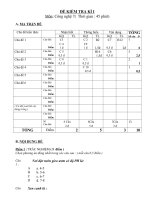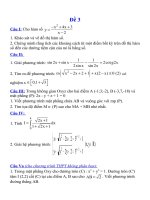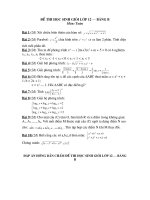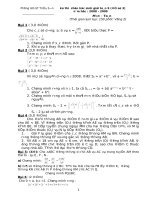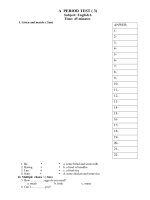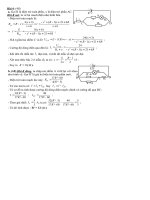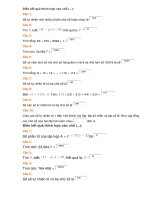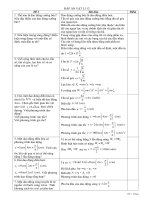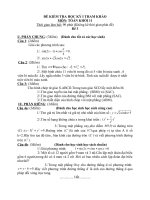Đáp án Writing 3 ENG 217 DTU 2023 Chapter 1
Bạn đang xem bản rút gọn của tài liệu. Xem và tải ngay bản đầy đủ của tài liệu tại đây (0 B, 49 trang )
LESSON 1: ADJECTIVE CLAUSES 1 (MỆNH ĐỀ TÍNH TỪ)
(WHO, THAT, WHICH- AS THE SUBJECT)
I.
LANGUAGE FOCUS
Subject Relative Pronoun: Đại từ quan hệ làm chủ ngữ
who,
which,
+V
that
- Adjective clause=Relative clause:
relative pronoun (who, whom, which, that…) (+ S) +V+…
- Function of Relative pronouns: are used to describe the noun before
(Chức năng của những đại từ quan hệ: những đại từ quan hệ được sử dụng để mơ tả cho
danh từ đứng ngay trước nó)
NOUN + relative pronoun (who, whom, which, that…)
Adjective clause: Mệnh đề tính từ
Relative clause: Mệnh đề quan hệ
Relative pronoun: Đại từ quan hệ
A relative pronoun can be the subject of its own clause.
Subject Relative Pronouns: who, which, that
American football, which is the most popular sport In the United States, began at
Harvard University.
In this pattern, who, which, and that can be either singular or plural. Make the verb agree with
the antecedent.
I have not read the magazine that is lying on the coffee table.
(The verb is lying is singular to agree with the singular antecedent magazine.)
I have not read the magazines that are lying on the coffee table.
{The verb are lying is plural to agree with the plural antecedent magazines.)
Adjective clauses are either restrictive (necessary) or nonrestrictive (unnecessary).
Restrictive (necessary): no commas: danh từ chung ko có dấu phẩy
The professor who teaches my biology class won a Nobel Prize two years ago.
Nonrestrictive (unnecessary): commas: danh từ riêng CÓ dấu phẩy
Professor Jones, who teaches my biology class, won a Nobel Prize two years ago.
The following examples show you how to combine two sentences to make a new sentence
containing a subject pattern adjective clauses.
For People
Restrictive
who, that
People save time and energy. They use microwave ovens.
People who use microwave ovens save time and energy.
People that use microwave ovens save time and energy.
1
Nonrestrictive Microwave cooking is not popular with most professional chefs.
Who
Professional chefs say that fast cooking does not allow flavors to blend.
Microwave cooking is not popular with most professional chefs, who
say that fast cooking does not allow flavors to blend.
For Animals and Things
Restrictive
Ovens are capable of cooking food quickly. They use microwave
That
energy. Ovens that use microwave energy are capable of cooking
foods quickly.
Nonrestrictive An electron tube in the oven produces microwaves. Microwaves cook
Which
by agitating the water molecules in food.
An electron tube in the oven produces microwaves, which cook by
agitating the water molecules in food.
***Reduce adjective clause/ Delete the subject relative pronoun:
Giản lược mệnh đề tính từ/ Loại bỏ đại từ quan hệ làm chủ ngữ:
Khi đại từ quan hệ (who, that, which) làm chủ ngữ thì chúng có thể được bỏ đi trong câu:
- You may delete the relative pronoun and the be verb when:
1. Subject relative pronouns are followed by a prepositional phrase.: mệnh đề tính từ có cụm giới
từ -> bỏ đại từ quan hệ và bỏ “be”
- prepositional phrase: cụm giới từ: là những cụm từ bắt đầu bằng giới từ
Ex1: The man who is in the house is my father.
The man in the house is my father.
Ex2: The books that are on the desk are mine
The books on the desk are mine.
2. The main verb in the relative clause is progressive tense.: động từ của mệnh đề tính từ là thì tiếp
diễn bỏ đại từ quan hệ và bỏ “be”
Ex1: The man who is swimming in the lake is my father.
The man swimming in the lake is my father.
Ex2: The books that are lying on the floor are mine.
The books lying on the floor are mine.
3. The main verb in all tenses: mệnh đề quan hệ có động từ của tất cả các thì khi bỏ đại từ
quan hệ thì động từ chính thêm “ing”
Ex1: People who buy lottery tickets are often found at bingo.
2
People buying lottery tickets are often found at bingo.
Ex2: The bus which leaves at 6:03 was late today, so I caught the 6:08 one for downtown.
The bus leaving at 6:03 was late today, so I caught the 6:08 one for downtown.
4. Passive voice: khi mệnh đề tính từ ở dạng bị động (be +V3) bỏ đại từ quan hệ và bỏ “be”
Ex1: The vase that was broken last night was my birthday gift.
The vase broken last night was my birthday gift.
Ex2: The children who are brought up in the countryside are usually healthy.
The children brought up in the countryside are usually healthy.
II. LANGUAGE PRACTICE
2.1. Combine the two sentences. Add commas if necessary.
1) She loves books (the books have happy endings).
She loves books which/that have happy endings.
2) They live in a city (the city is in the north of England).
They live in a city which/that is in the north of England
3) The man is in the garden (the man is wearing a blue jumper).
The man which/that is wearing a blue jumper is in the garden
4) Anyone must have a logical mind. He or she wants to be a computer programmer
Anyone who wants to be a computer programmer must have a logical mind.
5) Foreigners also have difficulty with English spelling. English spelling is not always
consistent with its pronunciation. .
Foreigners also have difficulty with English spelling which/that is not always consistent
with its pronunciation.
6) The fruit is on the table. The fruit isn’t fresh.
The fruit is on the table which isn’t fresh.
7) While he lectured, he showed us a slide. The slide diagrammed the double helix structure of
DNA.
While he lectured, he showed us a slide that/which diagrammed the double helix structure
of DNA.
2.2. Reduce the relative clauses
1.
The man who is standing there is a clown.
The man standing there is a clown.
2.
Benzene, which was discovered by Faraday, became the starting point in the manufacture of
many dyes, perfumes and explosives.
Benzene, discovered by Faraday, became the starting point in the manufacture of many dyes,
perfumes and explosives.
3.
My grandmother, who is old and sick, never goes out of the house.
My grandmother, being old and sick, never goes out of the house.
4.
Joggers who will run in the marathon should get to the stadium early to warm up.
Joggers running in the marathon should get to the stadium early to warm up.
3
5.
A person who does at least 30 minutes of exercise a day will feel better.
A person doing at least 30 minutes of exercise a day will feel better.
2.3. Identify Adjective clause in the following sentences
1. Environmental science, which is compulsory for all students, is one of the most popular courses in
the college.
……………………………………………………………………..
2. The woman who lives next door is a doctor.
……………………………………………………………………..
3. The envelop which lies on the table has no stamp on it.
……………………………………………………………………..
4. The student don’t know how to do exercise which were given by the teacher yesterday.
……………………………………………………………………..
5. Words in English which begin with the consonants th are often difficult for foreigners to
pronounce.
……………………………………………………………………..
III. PRACTICE IN TOEIC
3.1. Language building
a-Give some words which may be used to describe pictures 1-3. Compare with your
friends
b-Complete the following about pictures 1-3 with the suitable words
Picture 1
1. The man who is holding a suitcase is
shaking hands with the receptionist
2. The man who stands behind the counter
is shaking hands with the customer
4
Picture 2
3. The women sitting at the table are trying
to reach an agreement
4. The women who are sitting at the table
try to reach an agreement.
Picture 3
5. There are buildings on the side of the
river which have many people living in the
city.
6. People are walking along the path which
has many buildings on the side of the rive
3.2. Tactic Practice
3.2.1. Put the words in the correct order
Picture 1
1. The/ searching/ guard/ is/ the/ apart/ his/
arms/ man/ who/ has.
The man who has arms apart is searching his
by the guard
2. The /raising/ man/ who/ arms/ is/ his/ is/
the guard/ searched/ by.
The man who is raising his arms is searched by
the guard.
………………………………………….
……………………………………………
Picture 2
5
3. Some/ listening to/ people/ a pen/ man/
are/ the/ holding/ who is.
Some people are listening to the man who is
holding a pen.
4. The/ the left/ a presentation/ man/ on/ is/
making.
The man who is on the left is making a
presentation
Picture 3
5. The/ reading/ man/ sits/ a / the shelf/
book/ next to.
The man who is reading a book is sitting
next to the shelf
6. The/ book/behind /shelf/ reading/ man/
is/ the/ who/ is/ a
The man who is reading a book is behind the
shelf
3.2.2. Make sentences about the pictures with the suggested words
1. who/ discuss/ engineers
……………………………………………..
……………………………………………..
2. wait/ want/ line
3. modern/ locate/ river
6
……………………………………………..
……………………………………………..
………………………………………….
…………………………………………
IV. TEST PRACTICE
In this part of the test, you will write ONE sentence that is based on a picture. With each
picture, you will be given two words or phrases that you must use in your sentence. You can
change the forms of the words and you can use the words in any order.
tie/ boat
map/ look
1 The boat which is on the water is a yacht The people who are sitting in their car looking at the
map.
hat/ look
3 The hats which are on the table look
colorful
4.stand/ across
The man who standing across is looking at the
woman
7
woman/ hold
5. The woman who is holding a cup is using
the computer
teacher/ explain
the man who is explaining something on the
board is the teacher
8
(Lession 2 trang sau)
LESSON 2
PREPOSITIONS OF TIME & PREPOSITIONS OF PLACE &
PREPOSITIONS OF DIRECTION
I. Prepositions of Time
1.1. Prepositions that show a point of time
Since from until/by before/ prior to + a point of time (3 o’clock, July, Friday
morning, etc.)
The project team leader would like to see us before 5:00 p.m.
Notes:
1.
Until means up to a particular time or event; by means not later than.
The library will be open until 7.
You should submit the report by 7.
2.
Below are some common expressions expressing a point of time.
Three weeks from now
Three weeks prior to the date
From 3o’clock onward(s)
1.2. Prepositions that show a period of time or a duration
She has been using English for ten years.
Pete guided the employees through the training process.
Notes:
3.
FOR expresses how long something has lasted; DURING indicates when
something happens, meaning from the beginning to the end of a particular period.
The mechanic has been working on the project for 2 years.
Countless foreigners travel to Italy during the Christmas season.
9
4.
IN can also precede a period of time, meaning no more than/ within.
Your application for membership will be processed in two days.
1.3. Identifying a point of time or a duration to use prepositions correctly.
I will have this done (within/by) the end of the month.
We have been married (for/since) two years.
1.4. PRACTICE
1.4.1. Fill each gap with an appropriate preposition.
5.
The construction will be finished ______in_____ February.
6.
The meeting lasted _____for_____5 hours.
7.
He founded the organization ___in____1999.
8.
The National Art Gallery will be open __in_____ May.
9.
Every employee has to come back to the office ______at_ 2p.m.
10.
The factory will be closed __for____ the Christmas season.
1.4.2. Choose the correct option to complete each sentence.
11.
You have to pay a deposit (by/until/at/within) 30 days.
12.
The annual sales meeting will be held (in/at/on/for) noon.
1.4.3. Fill the gap with correct preposition
13.
What are you doing _____in___ the weekend?
14.
I don't know yet. Maybe I'll go to the cinema _____on____ Saturday.
15.
That's interesting. I haven't been to the cinema ______in____ so many years.
16.
We could go there together ___in_______ the afternoon.
17.
That would be great. But I would prefer to go there ___in______the evening. I am
visiting my grandma_____on____ Saturday.
18.
That's okay. The film starts ____at______eight o'clock.
19.
I can pick you up ____at_______ half past seven. How long does the film last?
20.
It lasts _______for_____ two hours and forty-five minutes.
10
21.
From eight till a quarter____to______ eleven.
22.
That's right. But I must hurry home _from________ the film. I have to be home
___until______ eleven o'clock.
II. PREPOSITIONS OF PLACE
2.1. Prepositions of Place
Identify the prepositions of place in the following examples:
Prepositions
Examples
--------------------------- He lifted his hands above/over his head.
------------------
Look in the cupboard below/under the sink.
---------------
I sat down beside/next to my wife.
--------------------
There is a park right behind the building.
-------------------------
There’s a table between a and chair a bookshelf.
The midday meal was served between 2 and 4 o’clock.
They walked among the crowds.
-------------------------
I like to sit near a window.
-------------------
All staff should be aware of activities within the company.
The profit of this year increased within five percentage points
of its competitors.
----------------------
Some of the travelers wanted to walk around the night
market.
2.2. Common expressions with over/ under/ between/ within/ around
In addition to showing a place, the preposition over/ under/ between/ within/ around
can be used to refer to a state, connection, relationship, etc.
Prepositions
Expressions
Over
Have the edge over
11
Under
Under new management
Under close supervision
Under current contract
Under control
Under pressure
Under investigation
Under review
under consideration
Under discussion
Under development
Between
A difference/ gap between A and B
Within
Within a radius of
Around
Around the world
Around the corner
B-LANGUAGE PRACTICE
1. The movie was interesting. We went to it.
the movie to which we went to it was interresting.
2. I met the people. You told me about them.
. I met the people about whom you told me.
3. I couldn’t understand the woman. I talked to her on the phone.
I couldn’t understand the woman to whom I talked on the phone.
4. I want to tell you about the party. I went to it last night.
I want to tell you about the party to which I went last night
5. The music was gentle. We listened to it last night.
The music to which we listened last night was gentl
6. Alice likes the foreign family. She is living with them.
11
Alice likes the foreign family with whom she is living .
7. The market has refresh vegetables. I usually go to it.
The market to which I usually go has refresh vegetables.
8. The man is over there. I told you about him.
The man is over there about whom I told you.
12
9. The film is fantastic. They are talking about it.
The film about which they are talking is fantastic.
10. She’s the nurse. We gave the flowers to her.
She’s the nurse to whom we gave the flowers to her.
11. We are speaking to the man. The man was our new history teacher.
The man to whom we are speaking was our new history teacher .
12. The teacher is Mr. Pike. We studied with him last year.
The teacher with whom we studied last year is Mr. Pike .
13. We are very interested in the problem. It has been discussed in class.
We are very interested in the problem which has been discussed in class .
14. Lung cancer is very dangerous. Million of people died of it.
Lung cancer of which million of people died is very dangerous
15. I like standing at the window. I can see the park from the window.
I like standing at the window from which I can see the park
2.3. PRACTICE
2.3.1. Choose the correct option given in brackets to complete each sentence
1. The car stopped (at/into/on) the intersection.
2. The new office is (at/on/over) the third floor.
3. There is a paper shredder (under/between/over) the desk.
4. There are many museums (into/in/at) the city.
5. I saw the notice (on/for/at) the board yesterday.
6. The law firm (across/through/ behind) the street will lay off 15 lawyers.
7. The executive officers walked (along/among/within/over) the corridor.
2.3.2. Complete the exercise according to the picture.
13
23.
(In/on/at) the picture, I can see a woman.
24.
The woman is sitting (at/ in front of/ on) a table.
25.
She is sitting (in/on/at) a chair.
26.
There is another chair (across/opposite/ beside) the woman.
27.
Her feet are (beside/on/under) the table.
28.
The woman is holding a cup (at/ in/into) her hands.
29.
(Above/ at/ on) the table are a laptop, a paper, a calculator, an appointment
calendar, two pens and a muffin.
30.
The woman is looking (at/on/to) her laptop.
31.
The woman's bag is (between/behind/under) the table.
III. Prepositions of Direction
3.1. Identify prepositions of Direction in the following examples
Prepositions
Examples
--------------------------- The copy can be obtained from the office
14
------------------
They will send the package to your client
---------------
We walked across the ice. pass /go past
--------------------
I walked through the woods.
-------------------------
Newman walked along the street.
-------------------------
I’m leaving for Busan.
-------------------
She walked towards me.
We moved all the luggage into the room.
----------------------
I took the key out of my pocket.
3.2. Common expressions with from/to/along/across/out of
Besides indicating direction, from also shows who gave the opinion, to refers to a state,
out of is used with the meaning without /beyond the range or limit of, etc. Below are
some common expressions
Prepositions
Expressions
From
from one’s viewpoint
To
to the relief of
to one’s satisfaction to a great
extent
to my knowledge
to your heart’s
content
along
along the shore
along the side of
across
across the street
across from the post
office
out of
out of date
out of control
out of stock
out of room
out of reach
out of town
out of season
out of print
out of paper
out of order
15
IV. PRACTICE
4.1. Decide which of the choices (A), (B), (C), or (D) best completes the sentence.
1. Subscribers to the online newsletter were informed that their names would be removed
_______ the list if they did not reply to the e-mail asking if they wished to be retained.
(A) to
(B) from
(C) for
(D) of
2. The new highway, which will run________the mountains, is expected to cause
irreversible damage to wildlife and the ecosystem.
(A) through
(B) during
(C) out
(D) against
3. “This product should be kept___________reach of children as it contains many toxic
agents.
(A) away with
(B) out of
(C) up until
(D) without
4.2. Complete the following sentences with the correct preposition:
to, toward, on, onto, in, or into. Some sentences may have more than one possible correct
answer. Remember that a few verbs of motion take only "on" rather than "onto."
1. Anna has returned __to____ her home town.
2. The dog jumped _into_____ the lake.
3. Are the boys still swimming __in____ the pool?
4. Thomas fell __on____ the floor.
5. The plane landed ___on___ the runway.
6. We drove toward__toward___ the river for an hour but turned north before we reached
it.
7. The kids climbed __on____ the monkey bars.
8. Joanna got __into____ Fred's car.
9. The baby spilled his cereal __on____ the floor.
10. We cried to the man on the ladder, "Hang ___on___!"
16
11. I went __to____ the gym.
12. Matthew and Michelle moved the table __into____ the dining room.
13. Allan left your keys ___on___ the table.
14. Dr. Karper apologized for interrupting us and told us to carry _on_____ with our
discussion.
15. I walk __to____ the amusement park.
16. Pat drove Mike ___to___ the airport.
17. Glenn almost fell __into____ the river.
18. The waitress noticed that there was no more Diet Pepsi __in____ Marty's glass.
19. Lee and Sarah took the bus that was heading _toward_____ the university.
20. Mary Sue jumped __on____ the stage and danced.
4.3. Choose the correct preposition:
1. We walked (up/down/ over) to the top of the mountain and then we cycled
(through/up/down) to the bottom again.
2. We both jumped (up/down/into) the swimming pool at the same time.
3. When I finished high school I drove (across/down/over) Europe in a caravan with two
of my friends.
4. In some countries, it's considered unlucky to walk (through/down/under) a ladder.
5. The athletes ran (around/off/up) the track for 1 hour.
6. You must always wear a helmet when you cycle in case you fall (under/off/into) the
bike.
7. The first person to swim (around/over/across) the English Channel was Mathew Webb,
in 1875.
8. He broke his ankle when he was trying to jump (over/ off/under) a hump in his street.
9. Ferdinand Magellan was a Portuguese sailor who sailed (off/around/over) the world in
the 16th Century.
10. In PE classes we have to climb (through/across/ up) a rope in 20 seconds.
17
11. He was skiing (down/under/around) the hill when he had the accident.
12. I would never do base jumping. I think it's really dangerous to jump (up/off/through)
a building even if you have a parachute.
13. Stunt motorcyclists sometimes jump (over/under/across) cars or even buses.
14. The boat sailed (out of/ along/across) the river up to the sea.
15. Get (out of/up/along) the car now! I have to take you to school.
16. Drivers in the Paris-Dakar drive (down/across/out of) the Sahara desert.
17. Our class walked (on/down/through) a beautiful forest during our last school trip.
18. If you are afraid of heights, don't look (on/down/through) when you are climbing the
mountain.
19. The teacher walked (into/through/up) the class, so we stopped talking and sat down.
20. If I walk (in/through/over) that door, I will never come back.
4.4. Complete the exercise with convenient prepositions.
1. I usually meet up _______ my friends _____ the weekend.
2. Don’t be late ________ school.
3. You are the new student _______Portugal.
4. Are you a teacher_______ this school?
5. Jessica is ________ vacation. She is ________ Italy now.
6. What is this called ________ English?
7. Look ________ the flowers.
8. Adam's birthday is _______ July.
9. Don’t run ________ the classroom.
4.5. Fill in the blanks with appropriate prepositions.
1.
Compare your answers _________your partner’s.
2.
This key holder is very special ____ me.
18
3.
Kittens and mice are _______the same place.
4.
Write _______ me soon.
5.
Have you got a piece ____ paper?
6.
What’s that CD for? It is ________ my exam.
7.
I’m tall _______ black hair and brown eyes.
8.
We have got a house ________ a big garden.
9.
I come _________ a big family.
10.
Match the pictures ________ the names.
11.
Is your house __________the country?
12.
Guess. What do have I have _______ my hand?
13.
I have got two pens. What ________ you?
4.6. Choose the correct answer:
32.
Go ___ these stairs until you reach the top floor.
A.
in
B.
through
C.
on
D.
up
33.
He was stopped by the police for driving ___ 120mph.
A.
on
B.
to
C.
for
D.
at
34.
I'm going ___ Madrid next week.
A.
to
19
B.
in
C.
of
D.
at
35.
We always listen to music ___ the way to work.
A.
by
B.
in
C.
on
D.
for
36.
Take your purse ___ of your pocket and give it to me.
A.
away
B.
off
C.
to
D.
out
37.
Are you talking ___ me?
A.
on
B.
of
C.
in
D.
to
38.
She called me ___ midnight.
A.
on
B.
at
C.
in
D.
of
39.
I'll see you ___ the morning.
20
